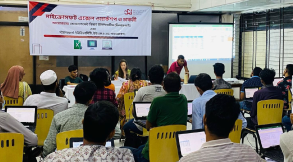The paper studies the implication of sectoral reallocations—the shift of labour from low- to high-productivity sectors on gender gaps in labour participation in Nigeria. We estimate a household model that allows household production and labour market supply to differ by gender and sectoral productivity to highlight the consequences of gender-specific labour market frictions on women’s labour market participation. First, as an outcome of structural transformation, we examine the effect of urbanization on gender differences in employment levels using the household-level dataset in Nigeria from 2010 to 2016. We show that aggregate household workweeks decrease after urbanization, but the negative effects for women are significantly larger than for men. Consistent with the "consumption cities" hypothesis, we find an increase in households’ demand for imported food and lower demand for locally grown food as urbanization increases. Second, as a source of structural transformation, we examine the effects of hydrocarbon expansion on gender-specific labour market frictions. Using a difference-in-differences model that exploits variation in oil production and proximity, we compare households residing within 20 km and outside the 20 km of hydrocarbon production in the urban and rural sectors. We find that proximity to oil wells has an adverse effect on women’s work, which is more pronounced for women in rural areas. Exploring barriers to transitioning from home to market, we show that proximity to oil fields increases home production activities. These results are robust to multiple specifications and support policies that address the macroeconomic misallocation of female labour resources.
STEG Working Paper Series
• Research Theme 2: Labour, Home Production, and Structural Transformation at the Level of the Household,
Cross-Cutting Issue 1: Gender,
Cross-Cutting Issue 3: Inequality and Inclusion
Structural Transformation and Gender-Specific Labour Market Frictions: Evidence from Nigeria

Related content
























































































































